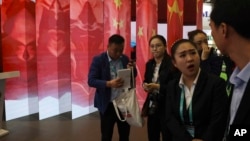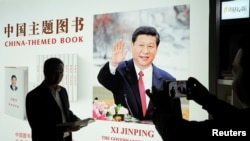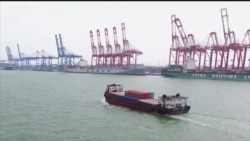China has pledged to use its army of consumers to boost imports dramatically over the next decade or so – a move that is aimed in part at addressing complaints about its trade surplus and unfair trade practices.
But growing household debts, a slowing economy and weakening currency, not to mention trade tensions with the United States, may complicate that effort, analysts say.
In an address at China’s first-ever import expo in Shanghai on Monday, Chinese President Xi Jinping pledged to promote imports and consumption upgrade – demand for pricier, better-quality premium products – with a goal to import $45 trillion in combined goods and services over the next 15 years, or an annual average of $3 trillion, up from last year’s $2.3 trillion.
“Catching on the nation’s consumption upgrade trend, China will take more proactive measures to boost people’s income and spending power, foster new growth areas of medium- to high-end consumption, constantly unleash the domestic market’s potential and expand the scope for imports,” Xi said.
But with the Sino-US trade war expected to hurt China’s exports and foreign reserves, local consumers are instead seen to pursue a consumption downgrade, said Frank Xie, an associate professor of marketing at the University of South Carolina Aiken.
“Any decline in foreign reserves will translate into a decrease in China’s buying power… What we’ve seen is happening now in China is consumption downgrade: the white-collar middle class is actually tightening its belt for tough days ahead,” Xie said, calling Xi’s remarks out of touch with reality.
Wang Yiming, deputy director of the State Council’s development research center, earlier estimated that China’s GDP growth could shrink by 1.5 percentage points if the U.S. eventually slaps a 25 percent tariff on all Chinese imports.
A meeting between President Donald Trump and Xi Jinping later this month on the sidelines of the summit for the Group of 20 nations will be key in deciding if that happens.
WATCH: China’s Pledges to Boost Imports May Face Headwinds
In addition to growth, other economists have warned that export losses could result in the shedding of millions of Chinese jobs.
Xie added that Chinese consumers are under heavy inflationary pressure, fueled by property price hikes, a figure the official inflation rate has seemingly failed to consider.
Property prices already contribute greatly to household debt, and people on average in China have more debt that their annual income, according to Daniel Zipser, senior partner at McKinsey & Company in Shanghai.
China’s consumption, discretionary spending in particular, saw a sudden double-digit drop in the third quarter, the worst in 20 years, following a robust growth in the first half of this year, he said.
But that is not stopping consumers from spending, he added.
“People are still trading up. However, what’s driving the slowdown in Q3 is that you see less spending in some categories, for example cars, because they are waiting and holding back in the terms of the overall economic anxiety,” Zipser said.
And while consumers haven’t been impacted directly yet by the trade war, discussion about that and the slump of China’s stock market over the past year are feeding that anxiety. He said the next six to nine months are likely to be softer but he is confident over the next two years about the health of the Chinese consumer going forward.
Nevertheless, the business conditions index, compiled by the Cheung Kong Graduate School of Business, dropped to the worst reading of 41.4 to date in October. Although the index’s month-on-month decline wasn’t dramatic, the deterioration of conditions for doing business in China shows that the majority of sampled companies, some of which are highly competitive, are pessimistic about their prospects for the next six months, the school said in a press statement on Wednesday.
Geographically, residents with flat incomes in lower-tier cities are apparently cutting back on spending, but demand among those in first-tier cities like Beijing and Shanghai remains strong, according to Zipser.
“Previously, some said that they had no desire of buying as a result of limited disposable incomes and rising product prices. But now, with salaries rising, they are daring to spend again,” a Shanghai resident surnamed Fang told VOA.
Despite seeing a bump in salaries, Fang said she prefers to make purchases using “daigou” – a channel of commerce in which shoppers overseas buy goods for consumers in China to help them avoid heavy import taxes.
Another Shanghai resident, surnamed Gao, said China should continue to look to developed economies for imports of advanced technology and skills but worried about the impact the trade war would have going forward.
“I hope that China will import more foreign technical skills, for example, in my line of work. I work in environment protection and hope that there will be more exchanges in this regard. That is, advanced environmental protection technology should be imported to China,” Gao said.
Professor Xie, however, is not as optimistic about China’s economic outlook.
He said a weakening Chinese yuan, which has recently dropped to near 7 yuan against the dollar, is adding pressure on the operation of businesses to repay their foreign currency-denominated loans.
Overall, a slowing economy, a weaker currency and rising debts owed both by households and businesses won’t bode well for China until its trade friction with the U.S. eases.






















